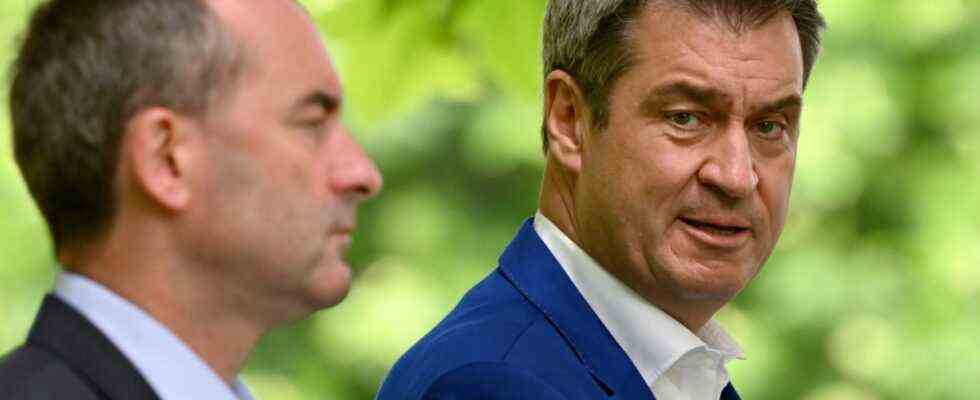In addition to the established parties, a large number of small and very small groups will be competing in this federal election: a total of 47 parties and associations are permitted. Exotics like the “Human World” or the “Garden Party” will usually end up somewhere in the alcohol range and not even come close to the 0.5 percent above which there is a state reimbursement of election campaign costs. But since polls suggest that the election could be very close this time around, the small ones may end up playing a much bigger role than usual.
What could actually happen? On the one hand, the proportion of “others” influences the percentage that is sufficient for the majority of mandates in the Bundestag and thus for a government alliance. “The more others, the fewer percentages you need to become chancellor,” says political scientist Karl-Rudolf Korte. On the other hand, some of the better-known small parties could take away the established decisive percentage points – even if none of the groups overcomes the five percent threshold in the Bundestag.
For example the free voters. In them, the Union is dealing with a new competitor in the Bundestag election that could cost them votes. The party is a coalition partner of the CSU in Bavaria and made it into the state parliament in Rhineland-Palatinate in the spring. Your boss, the Bavarian Minister of Economic Affairs and Vice-Prime Minister Hubert Aiwanger, may be ridiculed in some places for his dialect, but he has a considerable populist instinct.
Much to the annoyance of the CSU, Aiwanger presented himself as a vaccine skeptic and thus openly gazed at the voices of those unwilling to vaccinate. “This is extremely unfortunate for the CDU / CSU,” says political scientist Wolfgang Schroeder. If successful, Aiwanger wants to give up his government office in Bavaria and move to Berlin. He dreams of becoming a partner in a government coalition with the Union and the FDP and thus preventing the Greens.
At the moment, however, it doesn’t look like it. The free voters are traded in polls between two and four percent. But even such a result can cost the Union, above all, important votes. “That can be one to three percent for the Union”, says Wolfgang Schroeder and calls this magnitude “possibly decisive for the election”. The CSU in particular, whose poll rating has fallen sharply in Bavaria, is correspondingly nervous: Every vote for the Free Voters is a given vote, warned CSU boss Markus Söder, a direct attack on the coalition partner.
Volt could be dangerous for the Greens and the FDP
Another competitor could pose a threat to the Greens, but also to the FDP: The pro-European Volt party, founded four years ago, has been represented by one member in the European Parliament since 2019 and has so far made it into some local parliaments. In Frankfurt City Hall, Volt is even part of a coalition of four with the SPD, the Greens and the FDP. “The shooting star among the new small parties,” says Wolfgang Schroeder about Volt.
In its program, the party combines green, liberal and social elements, so it represents a kind of European traffic light. In the federal election campaign, Volt strongly focuses on the topics of Europe, digitization and education. “We hope for alternate voters,” says the 27-year-old Caroline Flohr, Volt’s top candidate in Lower Saxony and a member of the seven-member party executive. Although she finds her party’s election chances difficult to gauge, she is optimistic. “I believe it is possible to land between 2.5 and five percent”. If Volt, as a party that is only four years old, should jump the five percent hurdle, it would, according to Flohr, be “absolutely sensational”.
And then there is still a lone fighter who wants to get involved: Long-time CDU politician and Burda board member Jürgen Todenhöfer is one of the most colorful and controversial political figures in the Federal Republic. At a young age, Todenhöfer was a hardliner from the right wing of the CDU, but years ago he mutated into a fanatical opponent of the war. For many years he has been traveling to crisis areas in the Near and Middle East and has repeatedly triggered violent controversies with his reports and books.
On his 80th birthday last November, Todenhöfer left the CDU and founded his own party. The name: Team Todenhöfer. He runs for the Bundestag election with large posters and a rather left-wing, self-written program. He would consider a result of six percent “as little,” he says on the phone. Political scientists consider this to be completely utopian. Karl-Rudolf Korte speaks of a “loss of reality” and “self-euphorization”. Wolfgang Schroeder diagnoses “prepotent behavior”. He predicts Todenhöfer a result of “less than one percent” because: “What should motivate people to choose a complete outsider?”

